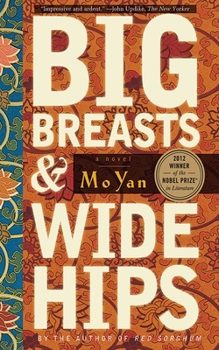Book Overview
In his latest novel, Mo Yan--arguably China's most important contemporary literary voice--recreates the historical sweep and earthy exuberance of his much acclaimed novel Red Sorghum . In a country where patriarchal favoritism and the primacy of sons survived multiple revolutions and an ideological earthquake, this epic novel is first and foremost about women, with the female body serving as the book's central metaphor. The protagonist, Mother, is born in 1900 and married at seventeen into the Shangguan family. She has nine children, only one of whom is a boy--the narrator of the book. A spoiled and ineffectual child, he stands in stark contrast to his eight strong and forceful female siblings. Mother, a survivor, is the quintessential strong woman who risks her life to save several of her children and grandchildren. The writing is picturesque, bawdy, shocking, and imaginative. The structure draws on the essentials of classical Chinese formalism and injects them with extraordinarily raw and surprising prose. Each of the seven chapters represents a different time period, from the end of the Qing dynasty up through the Japanese invasion in the 1930s, the civil war, the Cultural Revolution, and the post-Mao years. Now in a beautifully bound collectors edition, this stunning novel is Mo Yan's searing vision of twentieth-century China.
Format:Paperback
Language:English
ISBN:1611453437
ISBN13:9781611453430
Release Date:January 2012
Publisher:Arcade Publishing
Length:552 Pages
Weight:1.51 lbs.
Dimensions:1.2" x 6.2" x 9.0"
Related Subjects
Contemporary Education & Reference Family Saga Fiction Genre Fiction Literary Literature & FictionCustomer Reviews
4 ratings
Captivating
Published by Thriftbooks.com User , 15 years ago
Mo Yan, is a great writer. The story is very captivating -- fiction set in China with a backdrop of much of China's history.
Intriguing
Published by Thriftbooks.com User , 18 years ago
The novel is quite long, but shorter than it's original lenght. The book is twisted in some ways, but that's how you'll have to accept it. The book follows a family through four centuries and is an interesting read if you want to read about how intense life was in China during its revolutions. Mo Yan's use of magical realism definitely adds more to the novel's element.
Not Banned in China
Published by Thriftbooks.com User , 19 years ago
In fact, Mo Yan's work has never been banned in China. Nor is being banned a particularly good index of literary value. Mo Yan is a great writer despite never having been banned in China.
"Dying's easy. It's living that's hard."
Published by Thriftbooks.com User , 20 years ago
Setting this monumental family saga in rural Gaomi, in northeast China, where he grew up, Mo Yan vividly portrays political and historical events--most of them bloody--over the course of the twentieth century, from the Boxer Rebellion through the Communist Revolution, the Japanese invasion, the Cultural Revolution, and the death of Mao. Jintong, the only son of Shangguan Lu, tells the story of his remarkable mother, his eight sisters, and their families as they live through these seminal events. Shangguan Lu's early marriage and domestic life unfolds through flashbacks. With an infertile husband, whose family beats and abuses her for failing to produce a son, she resorts to extreme measures, giving birth to eight daughters by eight different fathers before finally producing a male heir. The stories of the daughters and their marriages to men with varied political agendas reflect the history of twentieth century rural China, and its unconscionable atrocities, starvation, death from exposure, forced marches, and land seizures. Author Mo Yan, who lived through the major events depicted here, gives a thorough portrait of rural life during these historical crises. The author's style, while often exciting, is also brutally realistic. Precise physical descriptions help bring the culture and people to life, including the kind of clothing nursing mothers wear so they can feed their children in very cold weather, descriptions of the silent "snow market," and facts and figures about the minimum amount of grain needed per person to keep farm workers alive for the harvest season. But the author also uses satire, wry comments, and black humor to criticize totalitarian governments and closed societies. Providing a helpful cast of characters at the beginning of this episodic novel, Mo Yan shows a society in which individualism has little meaning. The narrator and spoiled only son, Jintong, is neither a hero nor a fully realized character in the western sense, and though much detail is given about what characters do and how they behave, less consideration is given to how they think and why they behave as they do. Author of nine novels, Mo Yan, whose pen name, ironically, means "Don't speak," has sometimes been mentioned as a candidate for the Nobel Prize. The vibrancy and accuracy of his portraits of Chinese life, his steadfast insistence on showing life as it is, rather than as it ought to be, his celebration of resourceful women, and his willingness to take risks for his art make him one of the most influential writers in the People's Republic. Mary Whipple






